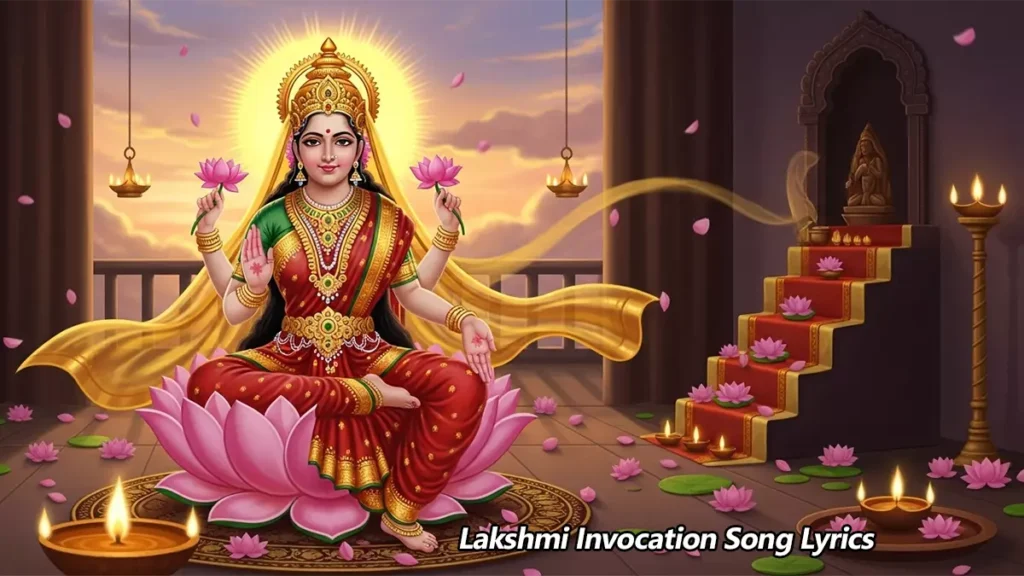The Lakshmi Invocation Song is a traditional Bengali devotional hymn chanted to invite Goddess Lakshmi, the goddess of wealth, fortune, and auspiciousness, into one’s home. This heartfelt prayer expresses a devotee’s humble plea for the divine presence, blessings, and protection of Maa Lakshmi.
Below is the transliteration of the original Bengali lyrics, followed by their English meaning and spiritual explanation.

Original Lakshmi Invocation Song (Transliterated)
Bengali (original) :
Esho Ma Lakshmi, bosho Ma Lakshmi,
Tobo konok-ancholkhani uraye,
Thako Ma Lakshmi ghorete amar.
Bilao du hate koruna siddhi-kona,
Thak dure, shob dukkho, O Ma pap-nashini.
Come, O Mother Lakshmi, take your seat,
Let your golden veil flutter gently,
Remain in my home, O Lakshmi.
With both hands, shower your grace and divine success,
Keep all sorrow far away, O Mother, destroyer of sins.
Meaning & Explanation: In this verse, the devotee invites Goddess Lakshmi to come and stay permanently in the home. The golden border of Her divine sari is imagined fluttering gently like a breeze of peace. The devotee pleads that She bestow blessings and success, and remove all sorrows and sins. The Goddess is worshipped as Pap-Nashini — the destroyer of sins.
Bengali (original) :
Sarvada pujjibo Mago charan kamalkhani,
Thako Mago grihete hoyiya achala.
Mago, tobo kripa-chhaya paibo sokole,
Raksha koro more bipod kale.
O Mother, I will always worship your lotus feet,
May you dwell permanently in my home.
Let your shade of compassion fall on everyone,
Protect me, O Mother, during times of danger.
Meaning & Explanation: “Dear Mother, I shall always worship your lotus feet. Please stay in my home as Achala (immovable and permanent). Let your grace protect my entire family from all dangers.” This line reflects the Sanatan belief in divine shelter and maternal protection.
Bengali (original) :
Mago esho, nidoya hoyo na,
Diyo koruna drishti,
Pad-chhaya deho e odhomo shontane.
Jeno pai Mago tobo apar koruna,
O Ma, tumi more chhere jeyo na.
Mother, please come — do not remain unkind,
Cast your merciful gaze upon me,
Let your sacred feet bless this humble child.
May I receive your boundless grace,
O Mother, please never abandon me.
Meaning & Explanation: Here, the devotee begs with childlike devotion — “Mother, please come. Do not be indifferent. Bless me with your merciful glance and sacred feet. Let me receive your infinite grace, and never abandon me.” It is a deep spiritual longing for the goddess’s unconditional love and care.
Bengali (original) :
Tomar-i shubho charan sparshe,
Jege othe hridoy, shoktir chhoa.
O Ma, shobar shirsho dibo sthan,
Hridoy bhore pujjibo tomar charan-kamalkhani.
With the touch of your holy feet,
My heart awakens with divine strength.
O Mother, I will place you above all,
And worship your lotus feet with my entire heart.
Meaning & Explanation: The devotee says, “O Mother, when I touch your holy feet, my heart awakens with divine energy.” The lotus feet of Lakshmi are revered as the highest place of worship, deserving full-hearted devotion and spiritual surrender.
Bengali (original) :
Mor pane chao Mago koruna-noyone,
Dao shantir porosh, e klanto hridoye.
Antime rekho charane, ei chahi bare bare,
Tumi-i toroni Mago e bhobo songsare.
Look upon me, Mother, with eyes full of compassion,
Touch this weary heart with peace.
At the end of my life, may I rest at your feet—
You alone are the boat that helps me cross this ocean of worldly life.
Meaning & Explanation: In the final stanza, the devotee prays, “Please look upon me with your eyes full of compassion. Grant peace to my tired soul. When my final moment comes, let me rest at your feet. You alone, O Mother, are the boat that helps us cross this ocean of worldly life.”
Why Lakshmi Invocation Song Is Special
This hymn is not just a song — it is a spiritual dialogue between the devotee and the Divine Mother. It’s rich in symbolism, deep in emotion, and rooted in the eternal Sanatan Dharma traditions. Singing or listening to this song during Lakshmi Puja, Fridays, or on Purnima (Full Moon) days is believed to attract peace, prosperity, and divine protection into the home.
